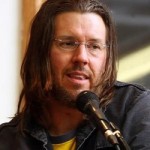A secular sermon on the folly of worshiping false gods…

Commencement speakers at secular colleges don’t usually deliver sermons. But sometimes they do, even though they call them “commencement addresses” and they don’t cite scripture. What these rare individuals do—along with a few poets, musicians, novelists, film makers and other artists—is blow away some of the cultural fog that hides the spiritual realities of everyday life. They push against the “suppression of truth” that St. Paul talks about in Romans 1. And, surely, it’s not a stretch of the imagination to believe that such truth-seeking messages can make way for the Gospel to be heard.
One commencement address that qualifies as a secular sermon was delivered by the novelist David Foster Wallace at Kenyon College in May 2005. Here’s the outline of an insightful passage on the folly of following false gods:
Everybody worships. The only choice we get is what to worship. And the compelling reason for maybe choosing some sort of god or spiritual-type thing to worship … is that pretty much anything else you worship will eat you alive.
· If you worship money and things, if they are where you tap real meaning in life, then you will never have enough, never feel you have enough.…
· Worship your body and beauty and sexual allure and you will always feel ugly. And when time and age start showing, you will die a million deaths before they finally grieve you.…
· Worship power, you will end up feeling weak and afraid, and you will need ever more power over others to numb you to your own fear.
· Worship your intellect, being seen as smart, you will end up feeling stupid, a fraud, always on the verge of being found out.
But the insidious thing about these forms of worship is … they’re unconscious. They are default settings.
David Foster Wallace’s talk, “This Is Water,” is available online, both the text and the audio. This short excerpt is only one of the many provocative passages that are worth reading and pondering—especially by those of us who would free ourselves from the unconscious default settings of our cultural moment.


 October 24, 2012
October 24, 2012 







Comments are closed.